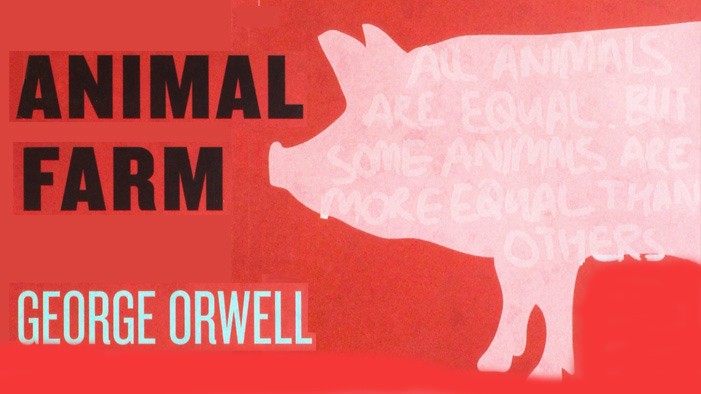(Book Review #1)
All animals are equal, but some animals are more equal than others.
Animal Farm, George Orwell
I – Context
Eric Blair who wrote under the name George Orwell was a writer and journalist engaged on various political topics. He exposed and critiqued the human tendency to oppress others politically, economically and physically. For instance, before writing Animal Farm, he had already described and criticized political regimes and conditions of living from around the globe in his earlier works (Poverty in London in Down and Out in Paris and London; Colonial Burma in Burmese Days; Spanish Civil War in Homage to Catalonia, etc…). But the critique and condemnation of totalitarian regimes is something his two most famous novels have in common: Animal Farm and 1984.
George Orwell’s Animal Farm has been published in 1945, just after the end of World War II and at the beginning of what we will later call the Cold War. In 1917, two successive revolutions rocked Russia and the rest of the world. The first one overthrew the Russian monarchy and the second one established the USSR, the world’s first Communist state. Over the next 30 years, the Soviet government descended into a totalitarian regime that used and manipulated socialist ideas of equality among the working class to oppress its people and maintain power.
Animal Farm is an allegory of the Russian Revolution and the Communist Soviet Union and many of the animal characters refers directly to figures or institutions in the Soviet Union.
II – Summary
The story takes place in a small farm located in England by the name of Manor Farm run by a farmer whose name is Mr. Jones. One night, a boar named Old Mayor, as he felt his end approaching, gathered the animals altogether and delivered a speech in which he revealed to the animals that men cause all the misery that animals endure. He also says that all animals are equal and urges them to rebel against Mr. Jones. Just before passing out, Old Mayor teaches them a revolutionary song called “Beasts of England” and two pigs named Snowball and Napoleon adapts his ideas into the philosophy of ‘Animalism’. With their best disciples, Boxer and Clover, they will try to convince the animals of the farm and even animals of other surrounding farms to join their ideological movement.
But pigs will gradually acquire human characteristics, including thirst for power. Everything is not going to go as Old Mayor planned.
III – Opinion
One of the things I liked about Orwell’s Animal Farm Is that the reader can interpret the work under different degrees of reading. A literal one: humanity is sinful, critique of the human authority on animals = common points between humans and the pigs depicted in the novel. The pigs adopt the worst parts of human nature. A second reading: critique of totalitarian regimes in general. Without the historical context every reader could not assert that the author is criticizing the Communist regime since the word “Communism”, “USSR” or “Karl Marx” aren’t explicitly written. The third interpretation that is more obvious and much deeper: the use of political allegories to criticize the Communist regime. Animal Farm = USSR, Animalism = Communism, Napoleon = Stalin, Snowball = Trotsky, Boxer = working class of the Soviet Union, Old Mayor = could represent Karl Marx since he is the one at the origin of the Communist ideology.
Another thing I particularly liked is the kind of humour used to discredit Communism. For example, the animals repeating blindly “Napoleon is always right” and never questioning anything. Or even the fact that when The Seven Commandments of the farm happen to get altered, no animal realises it. These things, among others, shows that the animals are constantly being ‘brainwashed’ by Napoleon in order to gain better control of them, as did Big Brother to the people of Britannica in 1984.
As an allegorical novel, I think Animal Farm does its job quite well. But the critique to the Communist doctrine feels absurdly obvious and therefore leaves little room for imagination and reflection. Another point that bothers me is that Orwell’s political views overlaps too much on the ‘plot’ and character development that is almost inexistent (probably also because of the short length of the book). There is no common thread and events just seems to occur one after another without much explanation only in order to match with the allegory of the USSR. As a result, Animal Farm looks more like a political essay than a novel.
That is why I would say Animal Farm is a great book due to the fact that it succeeds in criticizing totalitarianism using well-thought allegories but still contains some drawbacks that may not appeal to the reader.


Comments are closed